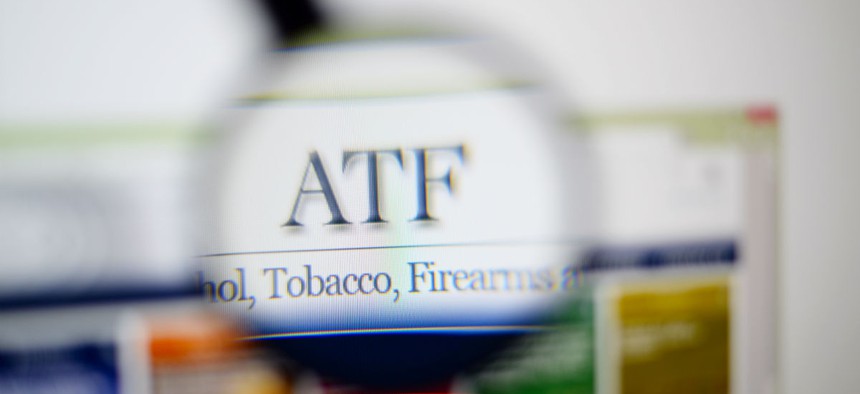
Gil C/Shutterstock.com
Report: Merge the ATF with the FBI
Agency is an “accident of history” and lacks a coherent mission, think tank says.
An “identity crisis” plagues the Bureau of Alcohol, Tobacco, Firearms and Explosives caused by tensions between its roles in law enforcement and regulation, says a think tank report released Tuesday. Its solution: merge the controversial 150-year-old agency with the “politically strong” FBI.
The liberal-leaning Center for American Progress, following two-years of research, made the recommendation because ATF was “originally not designed to be a police agency and often lacks the internal management and oversight structure required for consistently effective federal law enforcement operations.”
The bureau serves “crucial” regulatory functions in the area of gun control, and yet “has often channeled scarce resources away from the regulatory side of the house and has marginalized the regulatory personnel within the agency,” the report said. “This lack of a clear focus on either enforcement or regulation has prevented ATF from fulfilling any part of its mission quite well enough.”
Hence Congress and the Obama administration should merge ATF with the FBI, making ATF a subordinate division to address “inadequate management, insufficient resources and burdensome restrictions, and lack of coordination.”
Founded originally as a tax-collection authority, ATF was moved from the Treasury Department to the Justice Department in 2002. Leadership has long been a challenge for the agency. While Todd Jones was confirmed as ATF director in July 2013, he stepped down in March; prior to his confirmation the agency was without permanent leadership for seven years.
The agency has long been a lightning rod for gun rights advocates, including the National Rifle Association. ATF came under intense scrutiny several years ago for an ill-conceived program that aimed to tie straw weapons buyers in the United States to Mexican drug cartels through a series of sting operations, one of which became known as Fast and Furious.
In its report, the Center for American Progress stresses ATF’s mission of gun control. “Every day in America, assailants using guns murder 33 people,” it notes.
One advantage of the merger would be to improve FBI’s relationships with federal and local law enforcement, said the report, which was written by policy analysts and one former ATF special agent.
The FBI “has a poor reputation for partnership with other federal law enforcement agencies, especially when compared with ATF,” it said. A 2011 Government Accountability Office report exploring jurisdictional overlap between ATF, FBI, the Drug Enforcement Agency and the U.S. Marshals Service found that one-third of agents experienced disagreements with another agency over the previous five years, with 78 percent saying it negatively affected an investigation.
ATF’s budget, the report said, has “stagnated” in the past decade. Between 2005 and 2014, the FBI’s budget increased 62 percent, Immigration and Customs Enforcement’s budget increased 46 percent, and Customs and Border Protection’s budget increased 94 percent. But ATF’s hike, from some $878 million in 2005 to $1.18 billion in 2014, is “a modest increase of around 34 percent that, when adjusted for inflation, amounts to only a 10 percent increase.”
A merger might also raise morale, the report added. The agency has dropped to 138th in the Federal Employee Viewpoint Survey rankings of leadership.
Asked to respond, Justice Department public affairs spokesman Patrick Rodenbush said his department “supports ATF in its current form and believes Congress should fully fund the president's budget request that will enhance ATF's ability to carry out its important mission.” Praising ATF employees for their work in combatting violence and illegal weapons trafficking, he said the agency “continues taking innovative steps to strengthen their investigative capabilities and implement its frontline business model—a data-driven approach that focuses the agency's resources to achieve maximum impact."
(Image via Gil C/Shutterstock.com)







